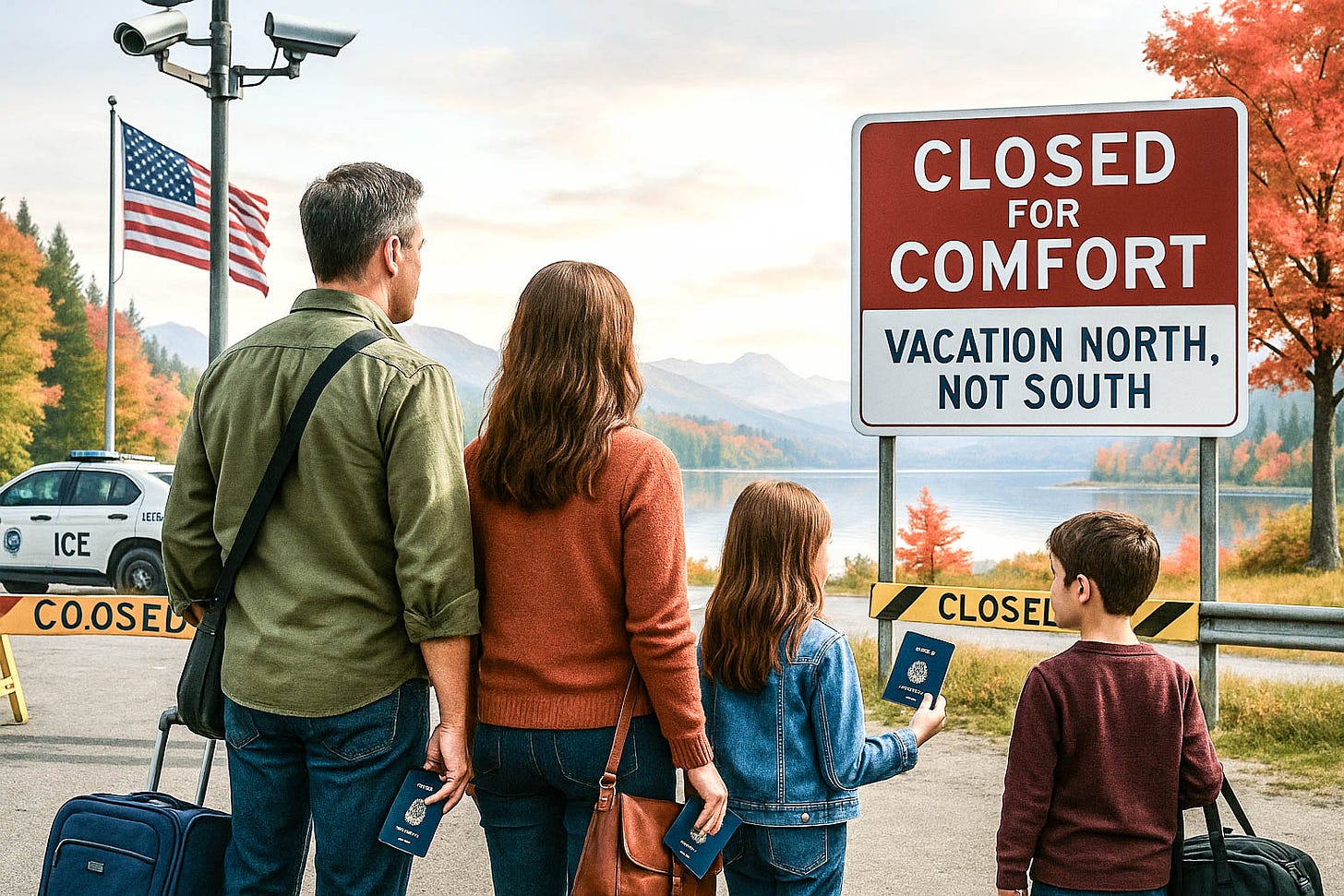Fear has a long shadow. It doesn’t simply fall over your next step — it darkens the ground behind you, erasing the path you once called home. I remember being pulled from a flight in Cleveland, young and defiant, a dual citizen and vocal opponent of the Vietnam War. My name was called over the loudspeaker like a summons from the underworld. I was escorted off the plane and “processed,” which is the polite word for hassled, interrogated, and pressed against the cold marble wall of bureaucracy. “State your citizenship,” the officer barked. I told him I lived in Canada. I worked in Canada. I paid taxes in Canada. I belonged to a country that didn’t send its sons to die for oil profits wrapped in patriotism. That wasn’t good enough. “You are American,” he insisted as if it were a tattoo I had to show, burned into the skin. There was no middle ground — just the heavy boot of identity as dictated by the state.
That was decades ago, but the old dread has new teeth. Now in 2025, the border isn’t just a line — it’s a threat. Under Trump’s second term, the United States is no longer the bruised democracy we once tried to mend. It’s something colder, meaner. A police state in the making, where agents invade public parks like soldiers in hostile territory and families scan the skies for drones instead of fireworks.
I understand the fear in the eyes of dual citizens. The numbers tell the story plainly. In February 2025, Canadian leisure flights to the U.S. dropped 40% compared to the year before. But the roads told the deeper story: a 23% drop in car crossings that month. Come March, road travel was down 32%. By April, 35%. Families are choosing to stay home, not because they no longer crave the warm air of Florida or the neon dazzle of New York, but because they’re not sure they’ll get back. The welcome mat has been rolled up, and behind the door is a man with a gun and a clipboard.
Fifty-five Canadians now sit in ICE detention. One man died. No name, no riot. Just a number in a spreadsheet, and a family is shattered. This isn’t fear of the unknown — it’s fear of what’s known. Fear of the knock at the motel door. Of being told you don’t belong. That you’re suspicious. That you’ve overstayed your welcome in a country where welcome has become a transaction, not a virtue.
This kind of fear sticks to the ribs. It lingers long after the agents leave.
I thought about that when I stood with Candido Camero in 2006, camera in hand, outside Massey Hall. Candido — the great conguero who lit the stage with Stan Kenton in 1954, who changed the language of percussion, who brought Afro-Cuban fire to the jazz heart of North America. He was in Toronto to accept a Pioneer Award at the National Jazz Awards. A lion in winter, dressed in elegance, still carrying the rhythm of Havana in his bones. As he prepared to return to New York, I asked if he’d ever consider revisiting Cuba — the island of his youth, of his triumphs, of his exile.
“They’ll arrest me,” he said, with a stillness that broke the air. “They’ll throw me in prison. That’s what Castro does.”
I tried to reassure him. Times were changing. The embargo was loosening. Reconciliation was in the wind. “They’d greet you like a hero,” I said. “Old friends. Music. Home.”
“Never,” he replied.
It wasn’t bitterness in his voice — it was fear. Not the irrational kind, but the type built on memory. The kind that curls around your ankles when you think about stepping on familiar soil that no longer belongs to you.
And now I get it. Fully. Now it’s us — the Americans abroad—who are learning to fear home. Not the flag or the soil or the people, but the state. The mechanisms of surveillance. The bureaucratic net. The unfeeling agents who follow orders written by cowards in suits. We are beginning to fear our homeland, just as Candido feared his.
You watch enough footage of ICE agents storming homeless encampments, of asylum seekers shackled, of dual citizens turned into bargaining chips, and it changes you. You don’t see Disneyland — you see detention. You don’t hear Springsteen — you hear sirens. You realize, slowly and then all at once, that your old home has become the place you warn people about.
I know some think this is alarmist. They live in bubbles where justice still works and laws are still honoured. But for those of us who’ve been stopped, questioned, tracked, threatened — we know better. We feel the pulse of history pounding through our chests. We’ve seen the faces of regimes before — this one wears a tie and an Instagram filter.
We are not leaving America. America is leaving us.
And like Candido, we carry that knowledge with us that some doors are best left shut. That some flags, once proud, now drape too easily over cages. That fear, once implanted, doesn’t just vanish — it becomes your shadow.
That is the actual cost of repression: it’s not just the arrests, the numbers, the headlines. It’s the quiet flight of spirit — the homes you never return to, and the songs you can no longer sing.







I learned so much from Candido. He was one of the most melodic conga players around. I used to practice to his patterns and then years later we met backstage in San Fran and he played my drums for a moment, as we were waiting to go on. I'd always imagined my drums saying, 'oh...that feels...good...don;t stop".